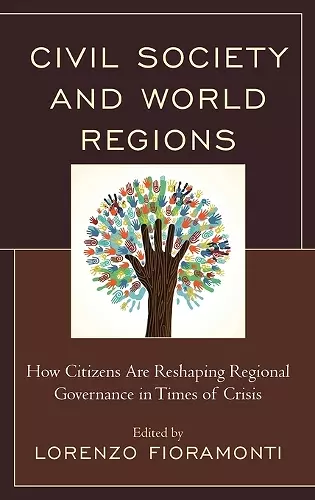Civil Society and World Regions
How Citizens Are Reshaping Regional Governance in Times of Crisis
Format:Hardback
Publisher:Lexington Books
Published:11th Dec '13
Currently unavailable, and unfortunately no date known when it will be back
This hardback is available in another edition too:
- Paperback£45.00(9781498514064)

Supranational regionalism and regional integration have for a long time been top-down processes, led by the few and imposed on the many. The role of citizens, especially those active in civil society, has been neglected by scholars, students, and commentators of regionalism. In reaction to the prevalence of these top-down models, a “new regionalism” approach has proliferated in the past few years. This book aims to further develop such a research agenda by providing an up-to-date overview of the contribution of civil society to world regionalism, from Europe to Africa, Asia, and the Americas. This is not only relevant as a research topic; it is also of critical importance from a political standpoint. As regions across the world experience prolonged governance crises, it becomes paramount to understand the extent to which these new regional formations actually reflect the interests and needs of their people. While old regionalism was accepted as a de facto elite-driven byproduct of both the Cold War and neoliberal globalization, the twenty-first-century regionalism—if it is to survive—will need to refocus its objectives through new forms of participation and inclusion. Regions without citizens are unlikely to stand the test of time, especially in times of crises.
This timely collection brings together varieties of civil societies and global regions; its contribution to regional governance is thus not just doubled, but rather squared. Informed by regional cases and experts, this book considers prospects for sustainable regional development at a time when the Old West is declining and ‘new powers’ are advancing. An important reflection on which interests are served by contemporary regionalism and which institutions may advance or decline in the post-global crisis era. -- Timothy M. Shaw, University of Massachusetts Boston
This book underlines the vital importance of civil society in regionalization processes across the globe. Legitimation, manipulation, and contestation are strategies that NGOs pursue everywhere in shaping the governance of regions. Editor and authors have succeeded in providing first-rate accounts that deepen greatly our understandings of regionalization as processes that are much more than state- or market-driven. Future work will have to take account of this significant reframing of the analysis regionalism in world politics. -- Peter J. Katzenstein, Cornell University
This must-read book provides detailed accounts of how citizens are reshaping regional governance structures. Far too little research has been conducted on how regionalization is spurred from below and this book provides much needed knowledge to the under-studied field. Scholars interested in comparative regionalism will find that civil society often contests existing regionalism paradigms and thereby fosters alternative models at various places across the globe. -- Michael Schulz, Associate Professor in Peace and Development, University of Gothenburg
Despite the explosion of regionalism throughout the world, the role of civil society remains neglected by academics and policymakers. This thoroughly researched book solves this fallacy, providing an impressive account of the many different ways in which civil society contributes to regionalism around the world. Anyone seeking to move beyond the state-centric and top-down perspectives dominating the research field will be inspired by this work. -- Fredrik Söderbaum, University of Gothenburg, Sweden
ISBN: 9780739187104
Dimensions: 235mm x 156mm x 20mm
Weight: 426g
204 pages